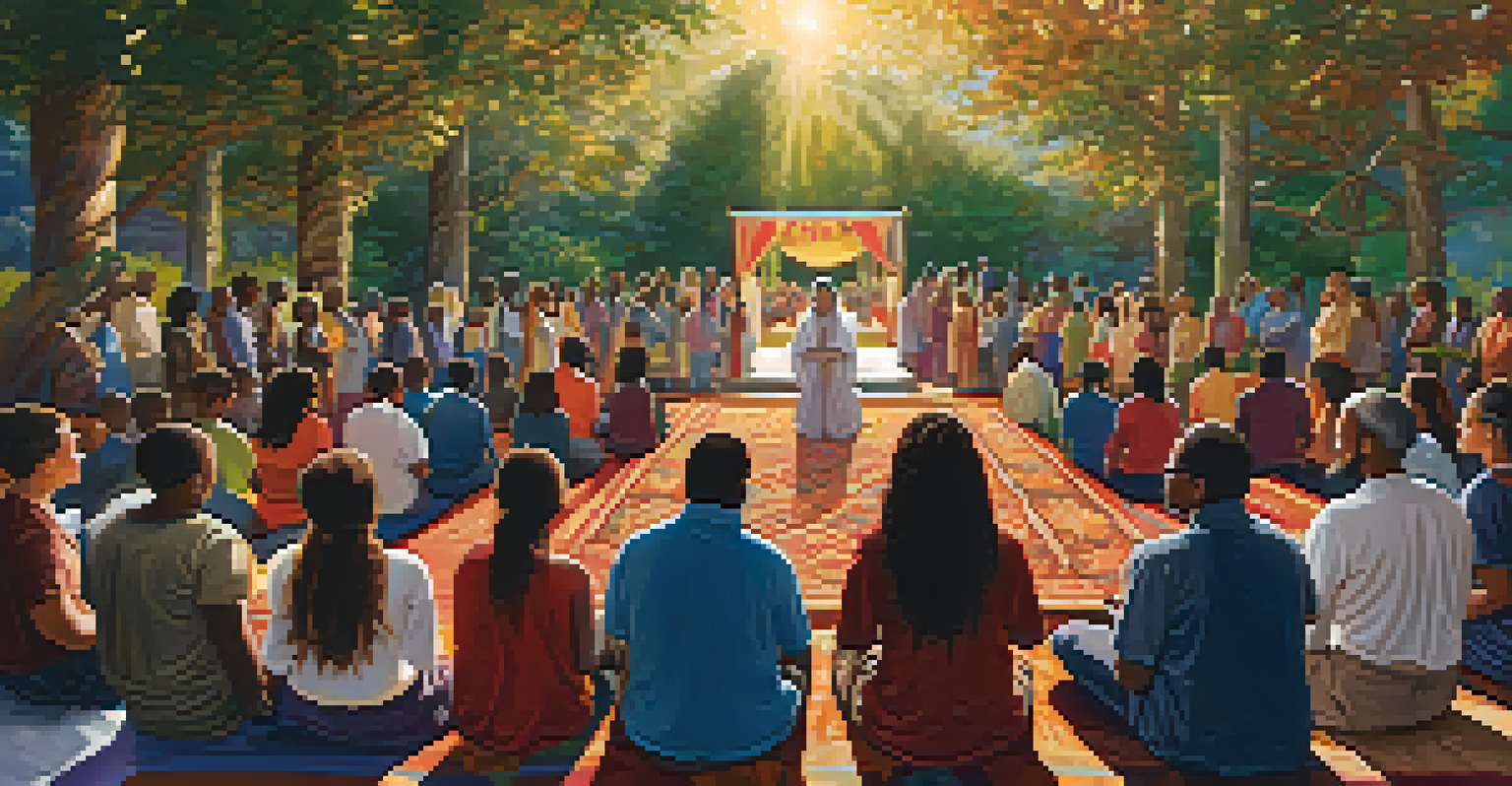The Interconnection of Spiritual Beliefs and Cultural Practices

Understanding Spiritual Beliefs in Cultural Contexts
Spiritual beliefs often serve as the backbone of cultural identity. They provide a framework through which individuals understand their place in the world. For instance, in many Indigenous cultures, spirituality is intertwined with nature, influencing rituals and daily practices.
Spirituality is the journey of the self, to the self, through the self.
These beliefs can vary widely, from polytheistic traditions that celebrate multiple deities to monotheistic faiths that focus on a singular divine presence. Each belief system shapes cultural practices, such as festivals, ceremonies, and community gatherings, reflecting the values and traditions of that culture.
Understanding this connection is crucial, as it reveals how deeply spirituality influences cultural norms and behaviors. For instance, in Hinduism, the reverence for cows has not only spiritual significance but also impacts agricultural practices and societal roles.
How Cultural Practices Reflect Spiritual Beliefs
Cultural practices often serve as a tangible expression of spiritual beliefs. For example, the act of lighting candles during religious ceremonies symbolizes enlightenment and the presence of the divine. Such practices can vary significantly between cultures, yet they all stem from a desire to connect with something greater than oneself.

These practices can also evolve over time, adapting to societal changes while still preserving their spiritual essence. Take the example of Christmas celebrations; while the core spiritual message remains, cultural adaptations—like gift-giving—have become central to the holiday experience across various cultures.
Spirituality Shapes Cultural Identity
Spiritual beliefs serve as a foundation for cultural identity, influencing values, practices, and community interactions.
This evolution highlights the dynamic relationship between culture and spirituality, where each influences and enriches the other. It helps us appreciate the diverse ways people express their beliefs through cultural traditions.
The Role of Rituals in Bridging Spirituality and Culture
Rituals play a crucial role in bridging the gap between spiritual beliefs and cultural practices. They serve as structured activities that embody the values and teachings of a belief system. For instance, in many African cultures, initiation rituals mark significant life transitions, reinforcing the community's spiritual and cultural identity.
Culture is the widening of the mind and of the spirit.
These rituals often involve symbolic actions, prayers, or ceremonies that reinforce a sense of belonging and continuity within the community. They can be as grand as weddings or as simple as daily prayers, each carrying profound meaning.
The significance of rituals lies in their ability to connect individuals to their heritage and to each other. Through shared rituals, communities strengthen their bonds, ensuring that spiritual beliefs are not just personal but communal experiences.
Cultural Symbols and Their Spiritual Significance
Cultural symbols often carry deep spiritual meaning, serving as a visual representation of beliefs and values. For example, the lotus flower in many Eastern traditions symbolizes purity and spiritual awakening. Such symbols can be found in art, architecture, and everyday life, embedding spirituality into the cultural fabric.
These symbols act as reminders of spiritual teachings and help individuals connect with their beliefs on a daily basis. In Western cultures, symbols like the cross in Christianity evoke a sense of faith and belonging, transcending mere decoration to represent profound spiritual truths.
Rituals Connect Community and Beliefs
Rituals act as structured expressions of spirituality, reinforcing communal bonds and individual identities.
Understanding these symbols enriches our appreciation of a culture's spiritual landscape. They remind us that what we see in our surroundings often reflects deeper beliefs about life, existence, and the cosmos.
The Influence of Globalization on Spiritual and Cultural Practices
Globalization has significantly impacted how spiritual beliefs and cultural practices interconnect. As cultures merge and interact more than ever, spiritual practices are often shared and adapted across borders. For instance, yoga, rooted in Hindu spirituality, has become a global phenomenon, influencing fitness culture worldwide.
While this exchange can enrich cultural practices, it can also lead to the dilution or misinterpretation of original beliefs. For example, when spiritual practices are commercialized, they may lose their intrinsic value and meaning, raising questions about authenticity.
Navigating this landscape requires a balance between embracing new influences and honoring traditional practices. Understanding the roots of these beliefs can help preserve their integrity while allowing for meaningful integration into diverse cultural contexts.
The Impact of Spirituality on Community Cohesion
Spiritual beliefs often play a pivotal role in fostering community cohesion. Shared beliefs can create a strong sense of belonging and identity among group members. For example, communal prayers or gatherings during religious festivals strengthen social bonds and reinforce cultural identity.
In many cultures, spirituality encourages practices of generosity and support, further enhancing community ties. The act of giving, whether through charity or community service, is often rooted in spiritual teachings, promoting a culture of compassion and cooperation.
Globalization Affects Spiritual Practices
Globalization facilitates the sharing of spiritual practices but poses challenges in maintaining the authenticity of original beliefs.
This collective engagement not only nurtures personal relationships but also builds resilience within communities. When individuals come together to share their spiritual beliefs, they create a supportive environment that fosters growth and well-being.
Exploring the Future of Spiritual Beliefs and Cultural Practices
As society continues to evolve, the interplay between spiritual beliefs and cultural practices will undoubtedly change. Modern technology and globalization are reshaping how individuals connect with their spirituality and cultural heritage. For instance, online platforms allow for the sharing of spiritual practices across the globe, creating new forms of community.
However, this evolution poses challenges, such as the risk of commodification and loss of traditional values. It is essential to engage critically with these changes, ensuring that the core teachings of spiritual beliefs remain respected and preserved.

Looking ahead, a deeper understanding of the interconnection between spirituality and culture can guide individuals and communities in navigating these changes. By honoring traditions while embracing modernity, we can cultivate a rich tapestry of beliefs and practices that resonate with future generations.